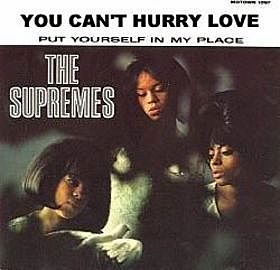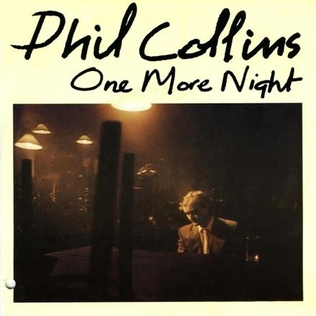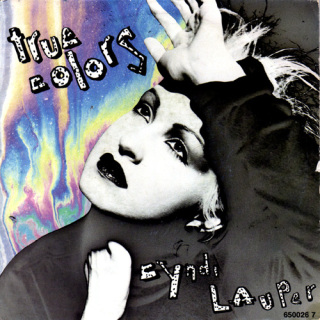
...But Seriously is the fourth solo studio album by English drummer and singer-songwriter Phil Collins. It was released on 20 November 1989 in the United Kingdom by Virgin Records, and on 24 November 1989 in the United States by Atlantic Records. After Collins finished touring commitments with the rock band Genesis in 1987, the group entered a four-year hiatus, during which Collins starred in the feature film Buster (1988). By the spring of 1989, Collins had written material for a new solo album, which addressed more serious lyrical themes, like socio-economic and political issues, as opposed to his previous dance-oriented album, No Jacket Required (1985).

"You Can't Hurry Love" is a 1966 song originally recorded by the Supremes on the Motown label. It was released on July 25 of 1966 as the second single from their studio album The Supremes A' Go-Go (1966).

"Another Day in Paradise" is a song written and recorded by English drummer and singer Phil Collins. Produced by Collins along with Hugh Padgham, it was released as the first single from his number-one album ...But Seriously (1989). As with his song for Genesis, "Man on the Corner", the track has as its subject the problem of homelessness and paradise; as such, the song was a substantial departure from the dance-pop music of his previous album, No Jacket Required (1985).

Hits, is the first greatest hits album by English drummer and singer-songwriter Phil Collins. It was released on 5 October 1998 in the UK, and one day later in the United States. The collection included fourteen top 40 hits, including seven American number one songs, spanning from the albums Face Value (1981) through Dance into the Light (1996). One new Collins recording, a cover of Cyndi Lauper's "True Colors", also appeared on the collection and was a popular song on adult contemporary stations. Hits was also the first Phil Collins album to include four songs originally recorded for motion pictures as well as his popular duet with Philip Bailey, "Easy Lover".

"One More Night" is the first single in the United States and second in the United Kingdom from Phil Collins' third studio album, the Diamond-certified No Jacket Required. "One More Night" was Phil Collins' second U.S. No. 1 single, following "Against All Odds", and was his fourth single to reach the top ten in the UK, peaking at No. 4 on the UK Singles Chart. In the U.S., the single entered the Billboard Hot 100 at number 50 on the chart dated 9 February 1985. It hit number one seven weeks later and remained on top for two weeks. In the UK, the single was certified silver by the British Phonographic Industry. It was also his first No. 1 on the U.S. Adult contemporary chart.

"Take Me Home" is a song written and performed by English drummer, singer and songwriter Phil Collins. It is the tenth and final track on Collins' third solo album, No Jacket Required. Collins co-produced the song with Hugh Padgham and released it as a single in the UK in July 1985 and the U.S. in March 1986. It did moderately well in the UK, peaking at No. 19. While it was not as successful as other singles from the album, such as "Sussudio" or "One More Night" in the US, it still reached the top 10, peaking at No. 7.

"Invisible Touch" is the title track and first single from the 1986 album of the same name by the English rock band Genesis. The song is a group composition which featured lyrics written by drummer and singer Phil Collins.

Serious Hits… Live! is the name of Phil Collins' 1990 live album, released on vinyl, cassette and CD. It is also the title of the 2003 DVD video release of his concert at Berlin's Waldbühne on 15 July 1990. The songs on the CD version are taken from various concerts during the Seriously, Live! World Tour. At the Brit Awards in 1992, the album brought Collins a nomination for British Male Artist.

"True Colors" is a song written by American songwriters Billy Steinberg and Tom Kelly. It was both the title track and the first single released from American singer Cyndi Lauper's second studio album of the same name (1986). Released in mid-1986, the song would become a hit for Lauper, spending two weeks at number one on the US Billboard Hot 100, becoming her last single to occupy the top of the chart. It received a Grammy Award nomination for Best Female Pop Vocal Performance.

"Easy Lover" is a song performed by Philip Bailey of the band Earth, Wind & Fire and Phil Collins of the band Genesis, jointly written and composed by Bailey, Collins, and Nathan East. The song appears on Bailey's solo album, Chinese Wall. Collins has performed the song in his live concerts, and it appears on both his 1990 album, Serious Hits... Live!, and his 1998 compilation album, ...Hits. It is Bailey's only US Top 40 hit as a solo artist.

"Separate Lives" is a 1985 song recorded by Phil Collins and Marilyn Martin and featured on the soundtrack to the motion picture White Nights. It reached No. 1 on the US Billboard Hot 100 and Adult Contemporary charts as well as in Canada and Ireland. It reached No. 4 on the UK Singles Chart, and was certified silver by the British Phonographic Industry.

"I Wish It Would Rain Down" is a song by English musician Phil Collins from his fourth solo studio album, ...But Seriously (1989). The song was a chart success in early 1990, peaking at No. 7 on the UK Singles Chart, No. 3 on the US Billboard Hot 100 and No. 1 on the Canadian RPM 100 Singles chart; in the latter country, it was the most successful song of 1990. Collins felt that it was as close as he had ever got, at the time, to writing a blues song.

"Sussudio" is a song by English singer-songwriter Phil Collins, released as a single in January 1985. The song is the first track on Collins' third solo studio album, No Jacket Required, released in February of the same year. The song entered frequent rotation on MTV in May; by 6 July both single and album reached No. 1 on their respective US Billboard charts. The song peaked at No. 12 in the UK Singles Chart.

"Do You Remember?" is a song by the English drummer and singer-songwriter Phil Collins. It was released in April 1990 as the fourth single from his fourth solo studio album ...But Seriously. It was produced by Collins and Hugh Padgham and features singer-songwriter Stephen Bishop on the track as a backing vocalist. The song had minor success in European countries but went to number one on both the Canadian and US Adult Contemporary charts. It also peaked at number four on the US Billboard Hot 100, becoming his 14th and last top-ten hit.

"Hang in Long Enough" is a song performed by Phil Collins and released as a single in 1990 from the album ...But Seriously. It was the sixth and final single from the album. The single reached No. 23 on the U.S. Billboard Hot 100, No. 34 on the UK Singles Chart, and No. 9 in Canada.

"That's Just the Way It Is" is a song by English drummer Phil Collins, released as a single in July 1990 from his fourth solo studio album, ...But Seriously (1989). The track features David Crosby on background vocals. The song was only released as a single in Europe and Australasia, while "Do You Remember?" was instead released in the United States. The song reached number 26 in the UK Singles Chart.

"Dance into the Light" is a 1996 song performed by English drummer, singer-songwriter, record producer, and actor Phil Collins, released as the first single from his sixth studio album, Dance into the Light (1996). It reached number nine on the UK Singles Chart, but was a disappointment on the US Billboard Hot 100, reaching number 45. B-sides are songs "Take Me Down" and "It's Over". The song also peaked within the top 10 in Czech Republic, Hungary and Scotland. On the Eurochart Hot 100, it reached number 29 in October 1996. The track was the only song from Dance into the Light to be featured on his compilation album ...Hits in 1998.

"It's in Your Eyes" is a single performed by Phil Collins and released in 1996 as the second single from his album Dance into the Light.

"Who Said I Would" is a song performed by Phil Collins that was originally recorded for his 1985 album No Jacket Required but was released in 1991 as a single from his live album Serious Hits... Live! in the United States and Japan.

"How Sweet It Is (To Be Loved by You)" is a song recorded by American soul singer Marvin Gaye from his fifth studio album of the same name (1965). It was written in 1964 by the Motown songwriting team of Holland–Dozier–Holland, and produced by Brian Holland and Lamont Dozier. The song title was inspired by one of the actor and comedian Jackie Gleason's signature phrases, "How Sweet It Is!"





















